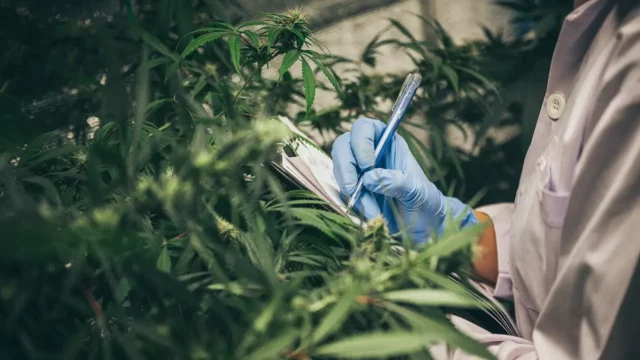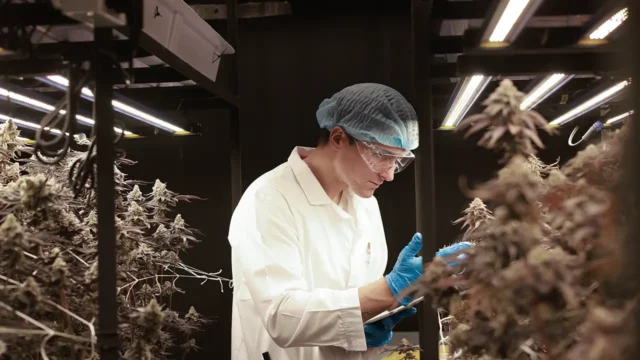The Best Options for Cannabis Financing

The Best Options for Cannabis Financing
Entrepreneurs from every industry need cash flow to drive business growth. Cannabis business owners are no different, but the obstacles they face in securing business funding vary significantly from typical businesses. Higher perceived risk, regulatory restrictions, and federal laws against cannabis make it difficult for cannabusinesses to secure funds.
Today, we’ll cover the basic financing issues for cannabis companies leading the way in the medical and recreational use of cannabis.
- What is cannabis financing?
- Who needs cannabis financing?
- What obstacles do companies face regarding cannabis financing?
- What are the requirements for receiving cannabis financing?
- Uses for cannabis financing
- Alternatives to traditional cannabis financing
Download the free ebook: Grow Your Cannabis Business–Overcome These Three Finance Challenges
What is cannabis financing?
Cannabis financing is the process of obtaining business capital through various financial resources to cover the costs associated with running a cannabis-related enterprise. When hearing about a cannabis business, cannabis dispensaries often come to mind. But cannabis cultivators, medical marijuana clinics, and other related cannabis businesses also require funding to drive operations.
While traditional financial institutions and lenders can provide cannabis business loans, financing is often obtained from private investors or venture capitalists due to the stigma attached to cannabis products.
The various options typically available to a startup looking for cannabis financing can include:
- Personal loans
- Home equity lines of credit (HELOCs)
- Business loans or lines of credit
- Supplier cash advances
- Credit union loans
- Equipment financing and leases
- Investments from accredited investors
- Angel investment
- Crowdfunding
- Backing from friends and family
Some of these forms of financing are harder to come by than others. Traditional loans may be unavailable. For private loans, the company must demonstrate its loan worthiness and also show off its differentiators. This is especially true when competing businesses open up in a new state shortly after legalization.
Regardless of which form of financing they choose, cannabis businesses must carefully examine legal considerations, interests, and risks to ensure they receive sufficient working capital while protecting their assets.
What types of businesses need cannabis financing?
There are two types of businesses within the cannabis industry: direct and indirect.
- Direct cannabis businesses are those that “touch the plant,” such as cultivators, dispensaries, distributors, and laboratories.
- Indirect businesses offer services that support the direct industry, such as packaging companies, technology providers, and equipment manufacturers.
Cultivators: Cannabis cultivators produce cannabis plants and components like CBD for both medicinal and recreational purposes. They grow and process plants to create standardized products sold at dispensaries. Cultivators use techniques like adjusting nutrient levels and controlling temperature and humidity to create new strains with desirable characteristics. They must adhere to government regulations and product standards when creating strains and cultivating plants.
Processors: A cannabis processor transforms raw cannabis materials into a variety of products, such as edibles, oils, concentrates, and tinctures. This process involves extraction, refinement, and packaging for consumer use while adhering to strict regulatory standards to ensure safety and quality. Depending on state laws, some dispensaries must purchase finished products from processors within their own state or jurisdiction.
Laboratories: Cannabis quality control labs analyze product samples for potency, terpenes, and contaminants. They provide reliable analytical results to the industry, ensuring all products meet regulatory requirements and industry standards. Labs also offer services such as genetic profiling to trace the plant's origin and authenticate the product. They play a critical role in consumer trust and cultivators' informed decision-making.
Distributors: Cannabis distributors help ensure a safe and secure supply chain for the cannabis industry by handling all steps in the distribution process. They are the link between cultivators and retailers, ensuring that cannabis goods reach the right place at the right time while meeting all government regulations related to compliance and taxation. They also often provide additional services such as inventory management, security, and product tracking.
Dispensaries: Cannabis dispensaries are regulated establishments where individuals can purchase cannabis and cannabis-related products for medical or recreational use. Staffed by knowledgeable personnel, these dispensaries offer a variety of strains and products, ensuring customers find the right fit for their needs, whether for therapeutic purposes or personal enjoyment.
Some businesses related to cannabis don’t face the same financing hurdles as those that work directly with the plant. However, dispensaries and other businesses will need financing to purchase from these types of businesses, making financing options equally important to their success.
Packaging: Cannabis packaging companies provide solutions for both recreational and medicinal products. They offer printing services, including logos, branding, and warning labels, and they use innovative and custom designs to help differentiate products from competitors. Essential for protecting integrity, packagers provide an extra layer of security to guarantee quality products by ensuring compliance with health and safety regulations, like child-resistant or tamper-proof packaging.
Equipment: Cannabis equipment providers are responsible for producing and maintaining specialized and general equipment used in the industry. This includes a wide range of items, from grow tents and trimming machines to commercial plant driers, extractors, and decarboxylators. They also provide the technology necessary to ensure that cannabis production is safe and efficient, like HVAC systems or water chillers. Cannabis equipment providers help with installation, maintenance, and repair services so that growers have access to reliable tools when they need them. They enable cannabis producers to meet safety standards and ensure quality control throughout the entire process.
Technology: Cannabis-related tech and SaaS software companies design software solutions for the cannabis industry, including inventory management and compliance tracking, plus mobile applications for real-time operations. A suite of analytical tools is also available to optimize production by gathering data on cultivation and greenhouse environments. Such technologies help growers maximize efficiency and profitability while remaining compliant with local regulations.
What are the obstacles to cannabis financing?
Cannabis businesses, particularly those operating in the US, face considerable obstacles when trying to obtain financing. Despite the recent move by individual states to relax their rules on medicinal or recreational cannabis use, THC remains illegal at the federal level. Cannabis and its derivatives are currently a schedule I controlled substance in the United States, though cannabis may soon move to Schedule III. For this reason, any transaction involving this drug must be reported.
The current federal prohibition of cannabis prevents many banks and traditional lenders from accepting the risk of providing funding. Federal prohibition specifically means that cannabis businesses are ineligible for favorable loans from the Small Business Administration (SBA). Additionally, lenders that assume the risks of funding cannabis businesses may factor it into the interest calculations for lending, charging increased interest rates compared to mainstream businesses.
Two sets of restrictions dissuade banks from financing cannabis-related businesses (CRBs): the Anti-Money Laundering Act (AML) and the Bank Secrecy Act (BSA).
- The AML requires banks to report suspicious transactions related to money laundering and other activities that could be considered illegal or unethical.
- The BSA requires banks to report all transactions over $10,000 and provides guidelines for proper recordkeeping.
The requirements for both regulations make cannabis too risky for lenders to offer financing to cannabis-related industries. Lenders that do offer options to cannabis-related businesses often limit their services to ancillary businesses such as general suppliers, labeling and packaging designers, and technology companies like cannabis-specific point-of-sale providers.
While they support direct cannabis sales, indirect businesses offer a more favorable risk profile to banks since they are subject to less stringent legal requirements.
What are the requirements for obtaining cannabis financing?
Although requirements vary by state, most cannabis-related entrepreneurs must meet the following requirements:
Strong personal credit rating: A strong credit rating is vital for securing financing for your business. For the major three credit bureaus, a score of 670 or above is in the “good” category. A high credit score gives potential investors confidence regarding timely loan payments. However, a strong credit may not save a business from being turned down or charged a higher rate.
Adequate credit history: A long history of good credit is essential when applying for financing, so lenders look for those with experience borrowing money and paying it back on time. As part of this, they review the borrower’s credit history, checking for recent activity and missed payments. A strong credit score coupled with a long history of timely repayment makes lenders more likely to take on the risk of providing capital and financing for your business.
Bankruptcy-free credit history: Lenders are often risk-averse, especially when handling a higher-risk loan like cannabis funding. Any indication that debt might not be repaid based on past performance is a major roadblock. Bankruptcy stays on a credit report for up to 10 years and might be used as a factor when reviewing your application.
Business account: A separate business bank account is required for cannabis lending, as it meets the increased reporting and regulatory requirements of applying for financing. Establish a business account under your business taxpayer identification number (TIN) along with any state filing requirements or permits.
US citizenship or resident status: US citizenship or residency is a requirement for borrowing funds to run a cannabis business. Regulations concerning lending and business permits for cannabis businesses may vary. Consult an attorney knowledgeable in this area for specific requirements.
Business plan: When seeking financing of any kind, a documented business plan with projected revenues, a mission statement, a SWOT analysis, and marketing plans form an important part of your financing application.
Uses for cannabis financing
Like many other retail or medical businesses, brick-and-mortar cannabis businesses like marijuana dispensaries and cultivators must source real estate, supplies, inventory, technology, and services to keep the business running.
Financing for the business often goes toward establishing locations and buying supplies and equipment for production and sales, including:
- Purchasing or leasing of office or manufacturing spaces for sales, cultivation, and testing
- Equipment to produce, test, or refine cannabis products
- Overhead expenses such as payroll costs, taxes, and other operational fees
- Research and development funding for new products and processes
However, risk and cash flow issues particular to the cannabis industry may make it difficult or impossible for these businesses to obtain equipment and get off the ground.
Alternatives to cannabis financing
There are some alternatives for companies seeking flexible, cost-effective ways to procure supplies for running a cannabis business. However, access to these avenues of financing isn’t universal. Businesses with cash often source goods and equipment through group buying or online ecommerce resources.
- Group purchasing organizations (GPOs) are third-party organizations that sell supplies to their members at discounted prices. GPOs can help cannabis businesses get the supplies they need without seeking traditional financing.
- Some procurement platforms offer services and vendor networks that support cannabis-focused businesses. These platforms provide many benefits for growing businesses, such as price comparisons, reporting functions, and spend management features. With these services, companies save time and money when sourcing products from suppliers, which helps them stay competitive in the market.
How Order.co approaches cannabis financing
Order.co takes a new approach to cannabis financing, providing risk reduction and reliable access to capital in a way that works for both buyers and vendors. This removes many obstacles that keep cannabis companies from reaching their full potential. With vendor and working capital access through Order.co, cannabis businesses can get up and running, source equipment, expand into new locations, and explore wider markets.
This is how it works:
- Cannabis businesses sign up with Order.co to buy supplies and equipment from their preferred vendors.
- Order.co provides flexible, extended net terms with an easy-to-complete verification process. Order.co acts as the buyer of record, eliminating the restrictions that block many companies from conducting business as normal.
- For large purchases, Order.co provides up to $500,000 in working capital to fund equipment purchases and other growth activities.
- Order.co’s extended terms and capital access allow businesses to get up and running quickly and start generating revenue before repayment begins. With revenue coming in, the cash conversion cycle (CCC) is greatly reduced, allowing companies to leverage financing to spur growth and stabilize cash flow.
Order.co gives cannabis startups the capital and vendor access they need to perform in new markets, providing a competitive advantage as cannabis access expands into new states and territories. Order.co has no difference in rates or access to capital based on the perceived risk profile of cannabis-related businesses.
Other sources of cannabis financing
There are ways to fund a cannabis business outside of traditional financing. As legalization sweeps the US, cannabis companies are attracting investment as a means to fund operations.
A few ways to achieve funding through investment include:
Equity: Some cannabis-related companies turn to the startup world for funding, selling a portion of their shares to investors in exchange for capital. This method allows cannabis companies to raise funds without incurring debt, providing vital liquidity for operations, expansion, or research and development. By giving away an equity stake, the company offers investors a share of its future profits and decision-making power proportional to their investment size.
For cannabis companies looking to attract equity investment, the future value of cannabis companies moving into new markets makes equity a good option for getting off the ground and promoting growth.
Debt financing (private loans): Debt financing involves borrowing money from private lenders, such as angel investors, with the promise to pay back the principal amount plus predetermined interest within a specified timeframe. Cannabis companies might opt for private loans to secure funding without encountering regulatory roadblocks.
Debt is particularly appealing for those looking to maintain full ownership over the business since it does not require giving up equity. Instead, debt financing allows companies to use future revenue to finance immediate needs or expansion projects.
However, debt financing comes with its own set of challenges. Businesses must be able to generate sufficient cash flow to meet repayment obligations. This method might also feature higher interest rates compared to traditional financing options. Despite these hurdles, private loans offer a viable path for cannabis businesses seeking capital without diluting their ownership stakes.
Case study: Trade Roots uses Order.co to fund growth
Massachusetts opened the door to legal recreational cannabis in 2018. Their state law allows a recreational dispensary to cultivate, manufacture, and sell cannabis flower and products under strict guidelines. All those activities mean a lot of orders — and a lot of complexity — for a burgeoning business. The list of necessary purchases is long: nutrients, gloves, and seeds for the back room and accessories, cannabis products, and retail supplies for the front of the house. All those purchases take capital.
Trade Roots turned to Order.co to help streamline procurement for all its needs, creating an ordering process that ensures easy stocking and replenishment of supplies for cultivation, packaging, and retail. With Order.co, the company got out from under the burden of manual procurement, automating and simplifying its purchasing process.
Order.co also gave Trade Roots access to vital capital to make purchases without relying on other forms of funding like loans or equity. With up to $500,000 of purchasing power through Order.co Financial Offerings, Trade Roots can take advantage of third-party labeling opportunities and order everything it needs to continue scaling.
Director of Operations and Facilities David Logan sums up the experience best: “It saves us time, it saves us money, and it even allows us to make money.”
Ready to “grow”? Get Order.co
In addition to leading-edge advantages for cannabis businesses, Order.co provides an easy-to-use interface that simplifies the process of researching prospective suppliers, finding the best pricing and terms, and using data-informed insights to grow a thriving business.
- Add your preferred vendors and create curated buying catalogs to ensure spend compliance and high-quality ordering.
- Use Order Financial Offerings to access extended net terms and capital advances and extended net terms for purchases of all kinds.
- Rely on comprehensive reporting to maintain compliance with financial regulations and demonstrate spend efficiency to investors.
To see how Order.co helps businesses of all types grow their operations, request a demo.
Get started
Schedule a demo to see how Order.co can simplify buying for your business.
"*" indicates required fields




